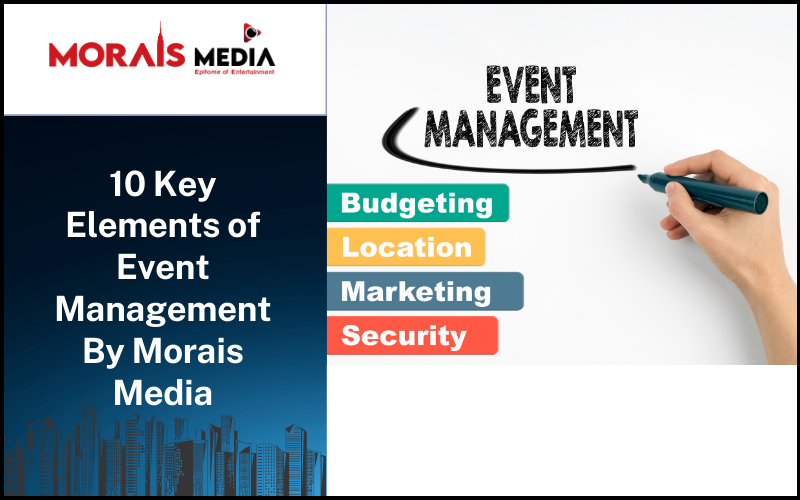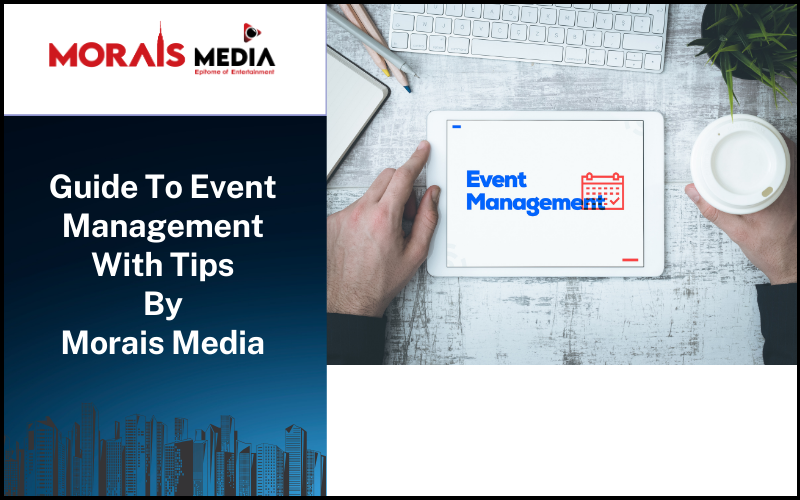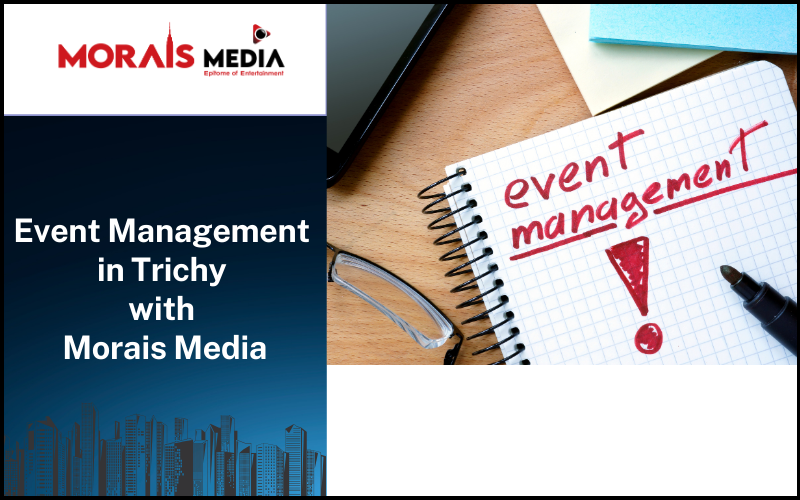
Introduction
Event management is a dynamic field that blends creativity with operational precision. It involves the strategic process of planning, organizing, and delivering events to meet specific objectives while leaving lasting impressions on attendees. It involves tasks like choosing the right venue, managing budgets, coordinating vendors, and ensuring everything runs smoothly on the day of the event. Whether it’s a business meeting, a cultural festival, or a grand celebration, each detail matters in ensuring events managed successfully achieve their goals. Professionals in the industry, from an event planning coordinator to members of an event management company, must understand how to balance creativity and strategy.
Effective event arrangement brings together various components like logistics, budgeting, and promotion to deliver a seamless experience.
10 Key Elements of Event Management
1. Developing an Event Theme and Concept
The theme and concept of an event are more than just creative choices; they influence every stage of the event management lifecycle. A well-thought-out theme helps convey the event’s purpose while enhancing audience engagement. To achieve this, event planning coordinators conduct brainstorming sessions with clients, identify their vision, and refine it into actionable ideas.
For example, a corporate gala could benefit from a sustainable theme, incorporating eco-friendly decor and catering to emphasize a commitment to green practices. On the other hand, cultural festivals may include regionally inspired setups that highlight local traditions and crafts, fostering community pride.
Additionally, the chosen theme often dictates critical event management logistics, such as decorations, activities, and even dress codes, ensuring a cohesive experience from start to finish.

2. Event Budgeting
Creating a budget for the event ensures financial discipline and clear prioritization. This process involves analyzing past expenditures, identifying fixed versus variable costs, and factoring in unforeseen contingencies.
For instance, an event organizing company managing a product launch might categorize expenses into:
- Fixed Costs: Venue rentals, equipment purchases, and permits.
- Variable Costs: Catering, based on headcount; decor customized per theme.
- Emergency Funds: Allocated for last-minute issues like additional AV support or unexpected guest requirements.
Incorporating a robust event business plan helps streamline financial decisions and ensures cost-effective execution.
3. Venue Selection and Management
When choosing venues, factors like size, amenities, and accessibility play a vital role.Selecting the right venue is pivotal in event management, as it directly impacts guest experience and logistical efficiency.
Morais City, a vibrant township near the Trichy International Airport, has emerged as a preferred location for events due to its excellent connectivity and modern amenities. Its strategic location and urban ecosystem make it an ideal choice for marketing & events, attracting both domestic and international audiences.
Customizing the venue setup based on client needs is a crucial aspect of event arrangement. For example:
- Conferences: Comfortable seating, advanced AV equipment, and breakout areas for networking.
- Weddings: Flexible seating, thematic floral decor, and elaborate staging for ceremonies.
Venue management also includes coordination with multiple stakeholders, from cleaning crews to technical teams, ensuring every element aligns with the broader event organizer business goals.

4. Program and Agenda Planning
A detailed program ensures the event flows without disruptions, keeping audiences engaged. Tailored agendas often reflect cultural nuances, attendee preferences, and event objectives.
For instance, a day-long workshop might include:
- – Morning sessions for formal presentations.
- – Afternoon breakout groups for interactive activities.
- – Evening networking with refreshments.
The timing of activities, particularly in marketing & events, significantly impacts audience engagement. Incorporating short breaks and surprise entertainment helps maintain energy levels.
Careful planning of the agenda supports seamless execution, an integral part of any event management process. Using time effectively enhances the overall experience while maintaining audience interest.

5. Promotion and Communication
Event promotion goes beyond mere advertising; it involves understanding the target audience and crafting tailored messages. Organizers leverage data analytics tools to monitor campaign performance and adjust strategies in real-time.
Promotional efforts often include collaborations with local influencers, cross-promotions with partner brands, and creative storytelling on digital platforms. Offline strategies, such as distributing flyers in high-traffic areas, amplify reach among local audiences.
An effective event business plan allocates a portion of the budget specifically for promotions to ensure maximum visibility and attendance.
No event can succeed without robust event management promotion. Effective event management involves using multiple channels, such as social media campaigns, email marketing, and offline advertising, to reach the target audience. Clear communication ensures attendees are well-informed, helping to build excitement and anticipation.
A well-rounded promotional strategy ensures maximum participation and enhances the event’s visibility. It also reinforces the importance of a solid event business plan, which includes a breakdown of promotional expenses.
6. Onsite Logistics
Onsite event logistics play a vital role in ensuring everything runs smoothly. This includes coordinating with teams for stage setups, managing attendee registration, and maintaining crowd control. Effective logistics are essential for creating a hassle-free experience.
Smooth onsite operations are a testament to efficient event management. This includes the coordinated setup of entry booths, stage designs, and dining areas to ensure seamless attendee experiences.
For example, a cultural event might involve:
- – Designated zones for performers, ensuring quick transitions between acts.
- – Clear signage to direct guests to different sections, reducing confusion.
- – A dedicated customer help desk to address attendee concerns.
Investing in onsite logistics ensures the event operates efficiently, reflecting positively on the event organizing company or independent planners involved.

7. Vendor Management
Reliable vendors are the backbone of successful events, providing essential services like catering, lighting, and photography. Vendor management involves selecting reputable providers, negotiating contracts, and ensuring timely delivery.
For example, a corporate conference organizers might require specialized services, such as:
- – High-definition video conferencing setups for international participation.
- – Custom catering options to accommodate diverse dietary preferences.
Building lasting relationships with vendors ensures better rates and priority service for future collaborations, enhancing the overall event organizer business efficiency.
8. Risk and Crisis Management
Identifying potential challenges and creating actionable contingency plans ensures event continuity. Every event is subject to potential risks, from equipment failures to weather disruptions.
For example, an outdoor seminar during monsoon season might include renting tents and arranging additional lighting in case of power outages.
A robust risk management framework integrated into the event business plan builds confidence among stakeholders and participants alike.

9. Post-Event Evaluation
Post-event reviews are essential to gauge success and plan for improvements. This includes detailed budget analysis, sponsor feedback, and participant surveys.
For instance, sending feedback forms through digital platforms post-event enables real-time data collection, offering actionable insights into areas like catering quality, program pacing, and overall organization.
Sharing a transparent post-event report with clients reinforces trust and professionalism, setting the stage for future collaborations.

10. Staffing and Volunteer Management
Efficient volunteer utilization is a hallmark of successful volunteer event management. Providing clear role descriptions and conducting training sessions ensures that every team member is prepared.
For instance, in a marathon event, volunteers might manage checkpoints, hydration stations, and participant registrations. Effective volunteer management not only minimizes costs but also creates a supportive and enthusiastic event atmosphere.
Frequently Asked Questions
- How much should I spend on an event promotion?
A: Allocate 10-20% of your total budget for effective event promotion.
- What is the difference between event planning and event management?
A: Event planning focuses on pre-event activities like designing the theme and schedule, while event management involves overseeing the event’s execution and post-event tasks.
- What is the role of a planning coordinator?
A: A planning coordinator oversees event logistics, scheduling, and communication to ensure everything runs smoothly.
- What factors should I consider when selecting a venue?
A: Key factors include the event’s size, location, amenities, accessibility, and cost.
- How do I create a schedule for an event?
A: Start by listing all planned activities, assign time slots to each, and ensure there are buffer times for any delays.
- How do I handle unexpected challenges during an event?
A: Prepare a contingency plan in advance and ensure your team knows how to respond to various scenarios.
- What is the event management payment?
A: Payments vary depending on the scope, ranging from hourly rates to fixed project fees, negotiated during planning stages.
Conclusion
Successful event management involves a harmonious balance of creativity, strategy, and technical expertise to deliver exceptional events. From crafting compelling themes to ensuring efficient event logistics, every element contributes to a successful outcome. Whether planning a corporate seminar or a cultural festival, understanding these key components helps professionals deliver impactful events.
By mastering these principles, whether as an individual planner or part of an event organizing company, you can ensure your events leave a lasting impression.

